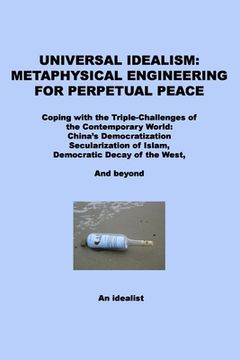Universal Idealism: Metaphysical Engineering for Perpetual Peace: Coping with the Triple-Challenges of the Contemporary World--China's Dem (en Inglés)
Reseña del libro "Universal Idealism: Metaphysical Engineering for Perpetual Peace: Coping with the Triple-Challenges of the Contemporary World--China's Dem (en Inglés)"
This book looks at the violent shifts of political authority through history and what might be done to change this pattern in the future. It examines the historical cycles observed by Gianbattista Vico, in which political authority shifts from non-existent (barbarism) to religious authority to military authority to people (democracy) and back to barbarism. According to European history, each shift produced mass violence of historical scale. The shift from religious to military authorities produced the Thirty Years War, and the shift from the military authority to democracy produced World Wars I and II. From this viewpoint, the contemporary world faces triple challenges. In addition to the democratization of China, the Islamic world is now going through the transition from religious to military authorities. And Western civilization is in the process of democratic decay. The fact that these three processes are proceeding simultaneously presents an enormous challenge. Each by itself can be very difficult to deal with. But if they were linked, it could devastate the entire world, which must be prevented at any cost. It proposes the first step toward the prevention of such devastation. It takes an approach encompassing philosophy, religion, science, art and history in order to address these challenges. It counters the prevailing trend toward specialization in academia and argues instead for the training of "metaphysical engineers" who would have the expertise needed to work toward a peaceful future. As the first step to set up the field of metaphysical engineering, this book begins with the field survey of physical engineering, copying its structure as much as possible. Then, it observes two major differences: metaphysical engineering's much larger size and no separation between object and subject. It begins to explore the way to make adjustments in applying physical engineering to metaphysical engineering. Methods to train metaphysical engineers are also explored. It is to help answer the call of many scholars, educators, policy-makers and concerned citizens who feel deeply this same need to create a more unifying approach to solve this impending problem. It provides general readers with encompassing basic knowledge, policy-makers with understanding of the root causes of the contemporary problems, and specialists with good sense of where their fields should fit into the whole system of knowledge. The insight gained by this approach will become a foundation for global cooperation.The closest approach taken to this book is Plato's The Republic. This book's approach closely parallels his approach. Indeed, in many regards, it should be considered as its update, except that in this project, religions and arts are given full credits and elements of realism are also incorporated. In addition, major classical works of Western civilization, including Aristotle, St. Augustine, St. Thomas Aquinas, Kant, Hegel, Machiavelli, Hobbes, Shakespeare, Michelangelo, and Johan Sebastian Bach, are referenced, along with the trends in other civilizations.Also, recently published Henry Kissinger's World Order (The Penguin Press HC, September, 2014) can nicely complement this project. His work is an extended study of the contemporary international society. Readers who just finished reading it can then read this book to understand from where these problems are derived, and in what direction we should proceed to find permanent solutions.It is received well by both policy-makers and academics.-An author has written a highly original book. Her own summary of her analytical methods captures remarkably well what she was trying to achieve. The result is a real intellectual tour de force. Ambassador James Goodby-Uniquely fascinating manuscript, which has many jewels of insight and revelation throughout its pages. I've never read anything quite like it!Dr. Jack Snyder

